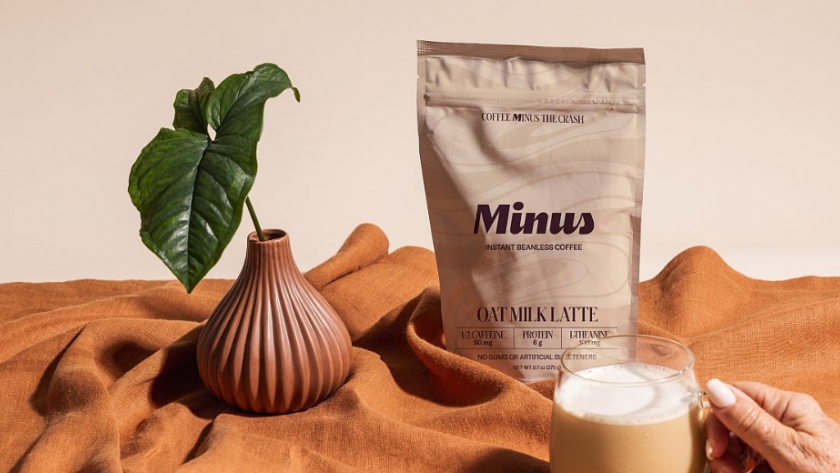
By Agroempresario.com
San Francisco-based startup Compound Foods, known for its beanless coffee brand ‘Minus,’ is taking a bold step into the business-to-business (B2B) arena. With the launch of a new ingredients platform, the company now offers plant-based alternatives to coffee, cocoa, and chocolate—helping manufacturers stabilize their supply chains in the face of rising prices and increasing uncertainty.
Founder and CEO Maricel Saenz explained to AgFunderNews that the move toward B2B was always part of the company’s long-term vision: “Large-scale transformation will always happen at the B2B level. From the beginning, we knew we wanted to build a consumer-facing brand like Minus to get direct feedback, which we could then leverage in conversations with larger industrial partners.”
Compound Foods initially launched a canned cold brew made without coffee beans. It later pivoted toward a more functional product: a powdered oat milk latte, fortified with protein, reduced caffeine, and enhanced with L-theanine. Now, the focus is on scaling these innovations to serve other food brands looking for clean-label, sustainable ingredient alternatives.
Compound’s core innovation lies in its ability to reverse-engineer coffee, cocoa, and chocolate at the molecular level. Through a proprietary database of ingredients and processes—including fermentation for more complex flavor development—the company can replicate the taste and functionality of these beloved ingredients without relying on traditional crops.
“We’ve built a database of strains and processes to recreate the complexity found in premium coffee,” Saenz said. “But we also have more cost-effective, non-fermentation options available. What matters most is that we have the building blocks to tailor products to a company’s unique taste and cost profile.”
This level of flexibility also makes Compound’s platform highly resilient. If one ingredient in a formulation becomes scarce or expensive, the system can easily swap it out for another validated alternative. “It’s all about having a diversified supply chain,” said Saenz. “If one of our ingredients is at risk, we can go into our database and immediately identify three or four viable substitutes.”
Another key strength of Compound Foods lies in its manufacturing strategy. While the formulations and processes are protected intellectual property, the ingredients themselves can be produced using standard food industry equipment—no proprietary machinery required.
“We’ve designed our products to be compatible with existing food production infrastructure,” Saenz noted. “That has always been our strategy—to scale through co-manufacturers and avoid the overhead of building our own facilities.”
The company’s beanless coffee alternatives are crafted using ingredients such as date seeds, chicory, sunflower seeds, carob, and grape seeds. For its cocoa and chocolate replacements, Compound uses blends of carob, mesquite, spent grains, sunflower lecithin, and cascara (the dried pulp of coffee cherries).
With coffee and cocoa facing increasing supply challenges—exacerbated by climate change, deforestation, and labor issues—Compound Foods offers a timely solution. As Shuo Yan, a partner at Lowercarbon Capital (one of the startup’s investors), said: “Coffee and cocoa are at a breaking point. Compound’s platform is a critical tool for food brands looking to adapt and thrive in this new reality.”
Already, the company is engaging with food brands that use coffee, cocoa, or chocolate in products such as granola bars, ice creams, and energy bites. These companies are eager to find stable, cost-effective alternatives that don’t sacrifice quality or flavor.
“There are more solutions emerging in cocoa than coffee, which is harder to replicate,” Saenz admitted. “But our expertise in coffee gave us a head start. When we moved into cocoa last year, we were able to leverage a lot of the foundational work we had already done.”
According to Saenz, the way Compound communicates its value proposition depends on the audience. “When speaking to industry partners, it’s about cost, taste, and performance,” she said. “For consumers, who aren’t always aware of supply chain threats, we focus on immediate, tangible benefits.”

The company’s oat milk latte mix, for example, is marketed around functional perks: lower caffeine, added protein, and L-theanine for smoother absorption. These are the types of benefits that resonate with consumers who love coffee but struggle with its side effects.
“People aren’t leaving coffee because of sustainability or flavor,” said Saenz. “They’re reducing consumption because it makes them feel jittery or anxious, or it disrupts their sleep. Our product offers a compelling alternative—and the feedback has been incredibly positive.”
To date, Compound Foods has raised approximately $10 million from investors including Lowercarbon Capital, Bossa Invest, One Way Ventures, Collaborative Fund, and Ulu Ventures. The startup is now poised to expand its ingredient platform and deepen its partnerships across the food and beverage sector.
In a world where climate resilience and supply security are becoming business imperatives, Compound Foods isn’t just selling ingredients—it’s offering a way forward. By helping brands decouple from volatile commodity markets, the startup could play a leading role in shaping the future of food.
